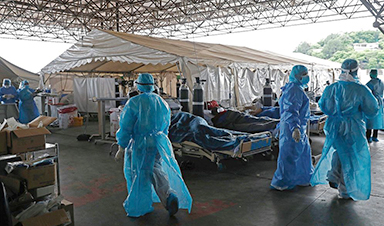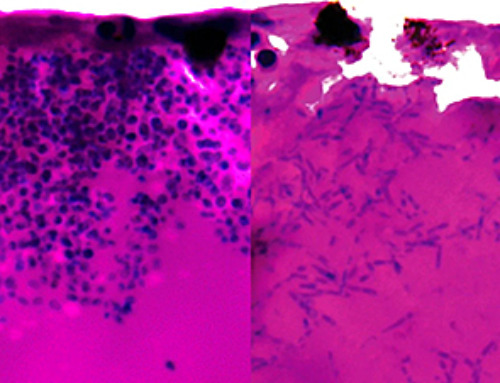The new variants of the coronavirus are even more dangerous than those known so far. Researchers and politicians fear a sharp increase in the number of infections, with dramatic consequences like those seen in Britain. Can Germany still stop the new killers?
The student didn’t really stand out among the nearly 700 cases of the coronavirus recorded by the public health department in Berlin’s Steglitz-Zehlendorf district during the week before Christmas. The young woman was home for the holidays to visit her family, having traveled back to Germany from the university where she is studying in the United Kingdom. It appeared to be an everyday case of the coronavirus in the affluent southern part of Berlin.
Indeed, it wasn’t all that surprising she had caught the virus, given that infection numbers were skyrocketing in Britain at that point.
But the student also infected her entire family, five people, which is pretty uncommon.
Just as her infection was discovered, British Prime Minister Boris Johnson had begun sounding the alarm: B.1.1.7, the new and far more contagious variant of the virus, was spreading in southeast England, he warned. The response came quickly: Flights to and from Britain were cancelled and the Eurotunnel was closed to traffic. By then, though, the mutated virus had long since begun spreading across Europe.
It was by coincidence that an employee at the Steglitz-Zehlendorf public health department had experienced the ebola pandemic in West Africa and had also earned a doctorate in virology. Shortly before Christmas, she made a call to the laboratory at the Robert Koch-Institute (RKI), Germany’s center for disease control, and asked to have the genome sequence of the student’s positive viral sample decoded.
The result arrived on Jan. 7. The student was found to be carrying the new B.1.1.7 variant of the virus.
Then, last week, the first case of B.1.351, a mutant of the coronavirus from South Africa, was detected in the southern German state of Baden-Württemberg. It’s also thought to be much more contagious than previous variants. It had been brought into the state by a family that had arrived back from South Africa in mid-December.
The family had quarantined themselves as required under coronavirus regulations, and five days later they received a negative result after getting tested. But family members developed symptoms of the disease a week later. By then, six people from three different households had been infected.
In the neighboring state of Bavaria, there are also now three confirmed cases of coronavirus mutants and one suspected case. One patient who had become infected with the British variant was brought to a Munich hospital for treatment around the New Year has since passed away.
“The new variant of the virus has arrived in Germany,” says Clemens Wendtner, chief physician at the München Klinik hospital in Munich’s Schwabing district. It must be a feeling of déjà-vu for the physician, who also treated the very first known German COVID-19 patients last February. “The next few weeks will be decisive,” Wendtner says. “It’s possible that the pandemic will take on a whole new momentum.”
Image Credit: Phill Magakoe/AFP
Post by Amanda Scott, NA CEO. Follow her on twitter @tantriclens
Thanks to Heinz V. Hoenen. Follow him on twitter: @HeinzVHoenen
News
Scientists Unlock a New Way to Hear the Brain’s Hidden Language
Scientists can finally hear the brain’s quietest messages—unlocking the hidden code behind how neurons think, decide, and remember. Scientists have created a new protein that can capture the incoming chemical signals received by brain [...]
Does being infected or vaccinated first influence COVID-19 immunity?
A new study analyzing the immune response to COVID-19 in a Catalan cohort of health workers sheds light on an important question: does it matter whether a person was first infected or first vaccinated? [...]
We May Never Know if AI Is Conscious, Says Cambridge Philosopher
As claims about conscious AI grow louder, a Cambridge philosopher argues that we lack the evidence to know whether machines can truly be conscious, let alone morally significant. A philosopher at the University of [...]
AI Helped Scientists Stop a Virus With One Tiny Change
Using AI, researchers identified one tiny molecular interaction that viruses need to infect cells. Disrupting it stopped the virus before infection could begin. Washington State University scientists have uncovered a method to interfere with a key [...]
Deadly Hospital Fungus May Finally Have a Weakness
A deadly, drug-resistant hospital fungus may finally have a weakness—and scientists think they’ve found it. Researchers have identified a genetic process that could open the door to new treatments for a dangerous fungal infection [...]
Fever-Proof Bird Flu Variant Could Fuel the Next Pandemic
Bird flu viruses present a significant risk to humans because they can continue replicating at temperatures higher than a typical fever. Fever is one of the body’s main tools for slowing or stopping viral [...]
What could the future of nanoscience look like?
Society has a lot to thank for nanoscience. From improved health monitoring to reducing the size of electronics, scientists’ ability to delve deeper and better understand chemistry at the nanoscale has opened up numerous [...]
Scientists Melt Cancer’s Hidden “Power Hubs” and Stop Tumor Growth
Researchers discovered that in a rare kidney cancer, RNA builds droplet-like hubs that act as growth control centers inside tumor cells. By engineering a molecular switch to dissolve these hubs, they were able to halt cancer [...]
Platelet-inspired nanoparticles could improve treatment of inflammatory diseases
Scientists have developed platelet-inspired nanoparticles that deliver anti-inflammatory drugs directly to brain-computer interface implants, doubling their effectiveness. Scientists have found a way to improve the performance of brain-computer interface (BCI) electrodes by delivering anti-inflammatory drugs directly [...]
After 150 years, a new chapter in cancer therapy is finally beginning
For decades, researchers have been looking for ways to destroy cancer cells in a targeted manner without further weakening the body. But for many patients whose immune system is severely impaired by chemotherapy or radiation, [...]
Older chemical libraries show promise for fighting resistant strains of COVID-19 virus
SARS‑CoV‑2, the virus that causes COVID-19, continues to mutate, with some newer strains becoming less responsive to current antiviral treatments like Paxlovid. Now, University of California San Diego scientists and an international team of [...]
Lower doses of immunotherapy for skin cancer give better results, study suggests
According to a new study, lower doses of approved immunotherapy for malignant melanoma can give better results against tumors, while reducing side effects. This is reported by researchers at Karolinska Institutet in the Journal of the National [...]
Researchers highlight five pathways through which microplastics can harm the brain
Microplastics could be fueling neurodegenerative diseases like Alzheimer's and Parkinson's, with a new study highlighting five ways microplastics can trigger inflammation and damage in the brain. More than 57 million people live with dementia, [...]
Tiny Metal Nanodots Obliterate Cancer Cells While Largely Sparing Healthy Tissue
Scientists have developed tiny metal-oxide particles that push cancer cells past their stress limits while sparing healthy tissue. An international team led by RMIT University has developed tiny particles called nanodots, crafted from a metallic compound, [...]
Gold Nanoclusters Could Supercharge Quantum Computers
Researchers found that gold “super atoms” can behave like the atoms in top-tier quantum systems—only far easier to scale. These tiny clusters can be customized at the molecular level, offering a powerful, tunable foundation [...]
A single shot of HPV vaccine may be enough to fight cervical cancer, study finds
WASHINGTON -- A single HPV vaccination appears just as effective as two doses at preventing the viral infection that causes cervical cancer, researchers reported Wednesday. HPV, or human papillomavirus, is very common and spread [...]





















